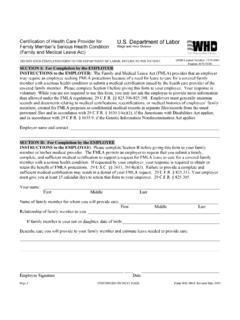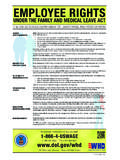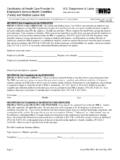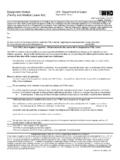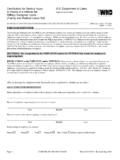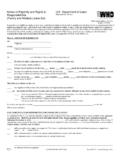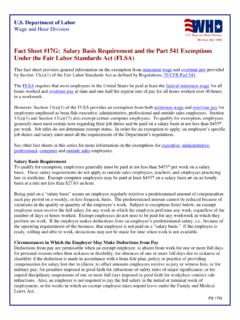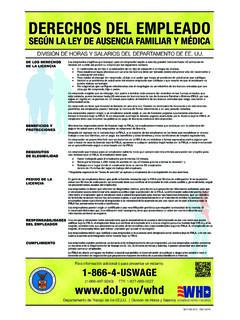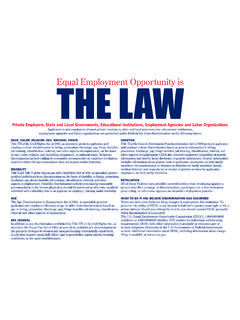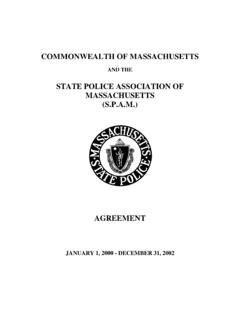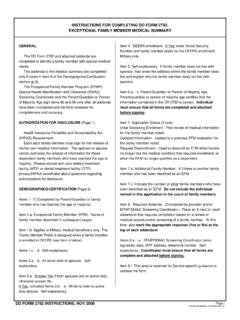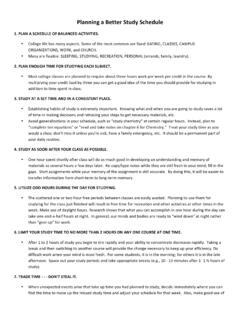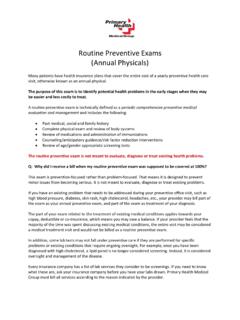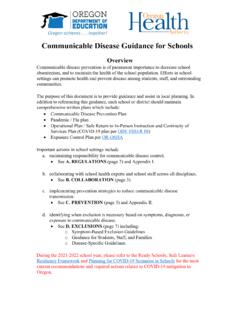Transcription of MILITARY FAMILY LEAVE - DOL
1 MILITARY FAMILY LEAVE WAGE AND HOUR DIVISION UNITED STATES DEPARTMENT OF LABOR The Employee s Guide to Under the FAMILY and Medical LEAVE Act Please reference The Employee s Guide to the FAMILY and Medical LEAVE Act for general information about taking FMLA LEAVE . An Introduction to MILITARY FAMILY LEAVE under the FAMILY and Medical LEAVE Act MILITARY families can fnd themselves facing great challenges. Caring for an injured servicemember, arranging for alternative childcare when a spouse is deployed to a foreign country, or attending arrival ceremonies when a loved one returns from a deployment may present FAMILY members with difcult decisions about time spent at work versus with FAMILY . The FAMILY and Medical LEAVE Act (FMLA) may be able to help. Since 1993, the FMLA has provided unpaid, job-protected LEAVE for those living with a serious health condition, or caring for a FAMILY member with a serious health condition.
2 The MILITARY FAMILY LEAVE provisions, frst added to the FMLA in 2008, aford FMLA protections specific to the needs of MILITARY families. This guide provides you a simple overview of how the FMLA may beneft MILITARY families. In your time of need, sometimes you just need time. This Guide Will Explain: Who Can Use MILITARY FAMILY LEAVE ? What are the FMLA MILITARY FAMILY LEAVE Entitlements? LEAVE Related to the Deployment of a MILITARY Member (Qualifying Exigency LEAVE ) LEAVE Related to a Seriously Injured or Ill Servicemember or Veteran ( MILITARY Caregiver LEAVE ) General FMLA Rights and Responsibilities How to File a Complaint Web Site Resources 2 The Employee s Guide to MILITARY FAMILY LEAVE YES STOP Your employer is not covered by the FMLA and does not have to ofer FMLA LEAVE Your employer is covered by the FMLA You have worked for your employer for at least 12 months You have at least 1250 hours of service in the last 12 months You are eligible for FMLA LEAVE Your employer has 50 or more employees within 75 miles of your job site NO YES NO AND AND AND STOP You are not eligible for FMLA LEAVE Who Can Use MILITARY FAMILY LEAVE ?
3 In order to take FMLA LEAVE , you must frst work for a covered employer. Generally, private employers with at least 50 employees are covered by the law. Private employers with fewer than 50 employees are not covered by the FMLA, but may be covered by state FAMILY and medical LEAVE laws. Government agencies (including local, state and federal employers), and elementary and secondary schools are covered by the FMLA, regardless of the number of employees. If you work for a covered employer, you need to meet additional criteria to be eligible to take FMLA LEAVE . You must: Have worked for your employer for at least 12 months; Have at least 1250 hours of service with your employer in the 12 months before you take LEAVE *; and Work at a location where your employer has at least 50 employees within 75 miles of your worksite.
4 * Special rules apply to airline fight crew employees. You work for an employer who has 50 or more employees OR You work for a public agency or elementary or secondary school The Employee s Guide to MILITARY FAMILY LEAVE 3 An Introduction to the MILITARY FamilyLeave Provisions QUALIFYING EXIGENCY LEAVE When a FAMILY member is deployed to a foreign country with the Armed Forces, your life can change very quickly. Many of these changes can require your prompt attention. Even though no one is ill or injured, you may need time away from work to address these issues. If your spouse, parent, son or daughter is a MILITARY member who is deployed or has been notifed of an impending deployment to a foreign country, and you work for a covered employer and are an eligible employee, you may be entitled to qualifying exigency LEAVE .
5 Qualifying exigency LEAVE allows you to take up to a total of 12 workweeks of FMLA LEAVE for qualifying exigencies, such as making diferent day care arrangements for the MILITARY member s children or attending ofcial MILITARY ceremonies as your FAMILY member prepares to deploy. See page 4 for more information on qualifying exigency LEAVE under the FMLA. MILITARY CAREGIVER LEAVE When faced with caring for an injured or seriously ill servicemember or veteran, the FMLA may be able to help ease the burden of worrying about your job during an already troubling time. If you are the spouse, parent, son, daughter, or next-of-kin of a covered servicemember, you work for a covered employer, and are an eligible employee, you may be entitled to MILITARY caregiver LEAVE . MILITARY caregiver LEAVE allows you to take up to a total of 26 workweeks of unpaid LEAVE during a single 12-month period to take care of your MILITARY relative if he or she has a qualifying serious injury or illness.
6 See page 10 for more information on MILITARY caregiver LEAVE under the FMLA. 4 The Employee s Guide to MILITARY FAMILY LEAVE Qualifying Exigency LEAVE Who can take Qualifying Exigency LEAVE ? To take qualifying exigency LEAVE , the MILITARY member must be your spouse, parent, son or daughter. Your spouse MILITARY Member Your parent Your son or daughter Yo u (Eligible Employee) Parent Parent means a biological, adoptive, step or foster father or mother, or any other individual who stood in loco parentis to you when you were a child. This term does not include parents in law. Son or daughter For qualifying exigency LEAVE , son or daughter means your biological, adopted, or foster child, a stepchild, a legal ward, or a child for whom you stood in loco parentis, and who is of any age.
7 In Loco Parentis A person stands in loco parentis if that person provides day-to-day care or financial support for a child. A person who has no biological or legal relationship with a child may nonetheless stand or have stood in loco parentis to the child for purposes of FMLA LEAVE . (See Administrator s Interpretation No. 2010-3 and Fact Sheets 28B and 28C). For example, if an employee stood in loco parentis to a MILITARY member when that MILITARY member was a child, the employee may exercise his or her FMLA rights to take qualifying exigency LEAVE for exigencies arising out of that MILITARY member s deployment to a foreign country. The Employee s Guide to MILITARY FAMILY LEAVE 5 Covered Active Duty Once you have determined that you are an eligible employee, you must determine whether your spouse, parent or child who is serving in the MILITARY is on covered active duty or call to covered active duty status (or has been notifed of an impending call or order to covered active duty ).
8 Covered Active Duty means: For members of the regular Armed Forces, duty during deployment of the member with the Armed Forces to a foreign country. For members of the reserve components of the Armed Forces (members of the National Guard and Reserves), duty during deployment of the member with the Armed Forces to a foreign country under a call or order to active duty in support of a contingency operation. Deployment to a foreign country means deployment to areas outside of the United States, the District of Columbia, or any Territory or possession of the United States, including international waters. STEP 1 You must work for a covered employer AND you must be an eligible employee Please see pg. 2 COVERED ACTIVE DUTY NOT ON COVERED ACTIVE DUTY STEP 3 The MILITARY member must be your spouse, parent, son or daughter NOT YOUR SPOUSE, PARENT OR CHILD STEP 4 You may take FMLA LEAVE for a qualifying exigency Please see pgs.
9 6-8 YOUR SPOUSE, PARENT OR CHILD STOP You are not able to take FMLA LEAVE for a qualifying exigency NO STEP 2 The MILITARY member must be on covered active duty YES Qualifying Exigency LEAVE Taken for a MILITARY Member 6 The Employee s Guide to MILITARY FAMILY LEAVE Qualifying Exigency LEAVE If your MILITARY relative is on covered active duty, you may be able to take FMLA LEAVE for the following qualifying exigencies: To address any issues arising from the MILITARY member s short-notice deployment ( , deployment within seven or less days of notice). You may take LEAVE for up to seven calendar days, beginning on the day the MILITARY member receives notice of deployment, to attend to any issue arising from the short-notice deployment. To make or update fnancial and legal arrangements arising from the MILITARY member s covered active duty.
10 This could include preparing and executing fnancial and healthcare powers of attorney, enrolling in the Defense Enrollment Eligibility Reporting System (DEERS), obtaining MILITARY identifcation cards, or acting as the MILITARY member s representative in arranging for MILITARY service benefts. To attend counseling for yourself, the MILITARY member, or the child of the MILITARY member, when the need for that counseling arises from the MILITARY member s covered active duty and is provided by someone other than a health care provider. To attend MILITARY events and related activities. These could include ofcial MILITARY ceremonies, MILITARY programs, FAMILY support programs, and/or informational briefngs sponsored or promoted by the MILITARY or MILITARY service organizations that are related to the MILITARY member s covered active duty.
